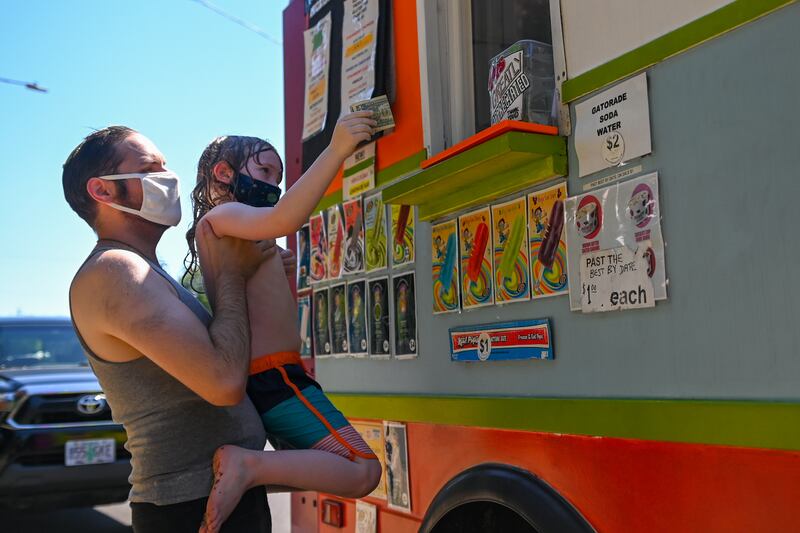On Friday, the heat dome descended. Portlanders were trapped inside.
“Heat dome” is a term that now joins the expanding glossary of Oregon horrors nobody had heard of a year ago. Over the course of a sweltering weekend, Portland experienced what one climate expert told WW was a “diabolical” weather event that a bunch of meteorologists couldn’t have planned had they circled a table and conjured up every terrible contributing factor possible.
The result? A 116-degree high on the afternoon of June 28, the third consecutive day Portland experienced temperatures never before reached in city history. Suddenly, the fact of climate change felt not only real but inescapable—as if we were a city of frogs boiling alive.
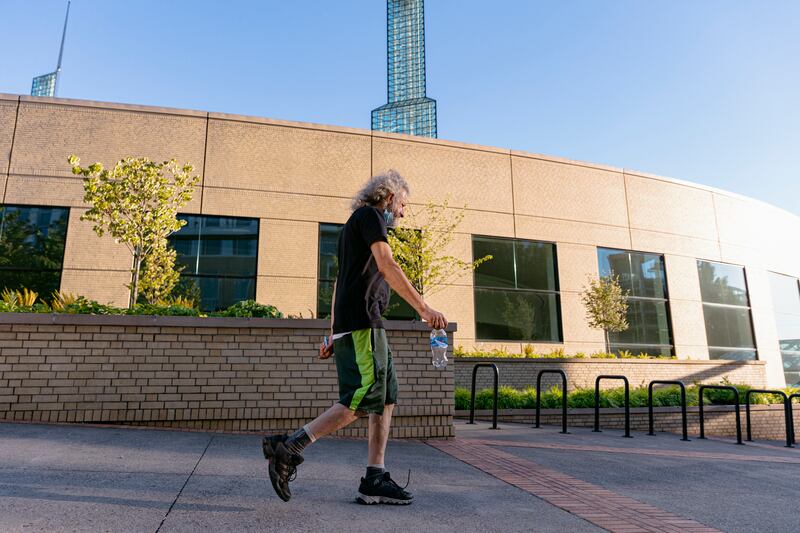
MAX trains ground to a halt, their overhead wires heated to 140 degrees. Streetcar power cables on the Broadway Bridge melted. Stone slab roads in the Kenton neighborhood cracked in two.
For three days, we went out in the heat—to meet the people trying to escape it. We spent much of our time in and around the cooling shelters set up by Multnomah County to provide relief to people without air conditioning—some 21% of the city. Here’s who we met.
FRIDAY, JUNE 25
Oregon Convention Center
12:30 pm | 90 degrees
Thirty minutes before the Multnomah County cooling shelter opens, a figure darkens the doorway. “Is it open yet?” the man asks. A volunteer checks to make sure he’s well enough to wait outside. Later, people will show up with heat stress and lie on the cool, smooth concrete floor of the convention hall, while medical workers watch to see if they’ll need further attention.
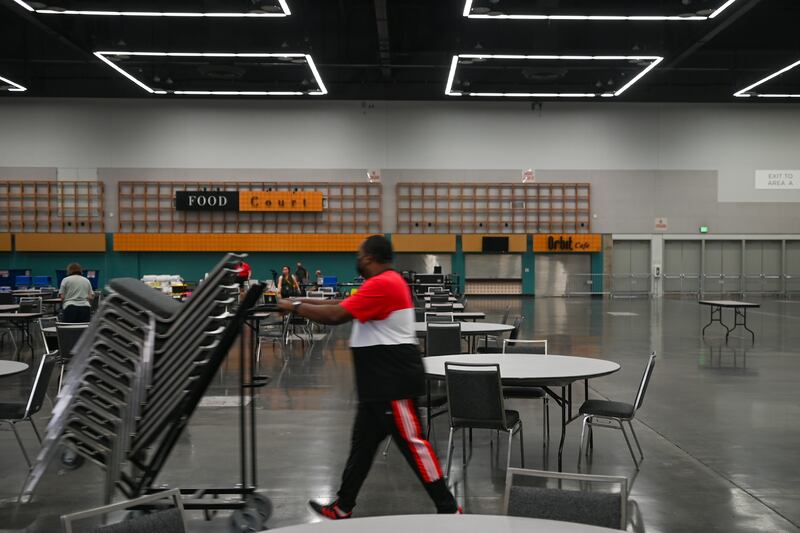
The Oregon Convention Center hasn’t hosted a convention for more than 17 months. In that time, it has been used for at least four emergency purposes: cold weather shelter, hot weather shelter, COVID testing site, and the state’s largest vaccination clinic.
“[In the cold] you can always put on more layers,” Multnomah County health officer Dr. Jennifer Vines explains. She’s there to supervise the setup. “But in the heat, it’s very hard to cool off without getting to a cool space. Our bodies actually tolerate cold a bit better than they tolerate heat. So heat is more of an emergency, in terms of getting someone help quickly.” SUZETTE SMITH.
Arbor Lodge
5 pm | 93 degrees
A confusing address posted on social media has left the Arbor Lodge cooling shelter almost empty. Inside the lights are dimmed and padded black mats lie in geometrically attractive lines.
William is eating a banana. He’s on the phone with his daughter. He puts his phone down when we approach, but she seems to stay on the line, at one point interjecting to correct him about a detail. “My memory was real good before corona,” he says. “Now it’s nothing but one or two.” He can’t do more than one thing at a time without becoming distracted.
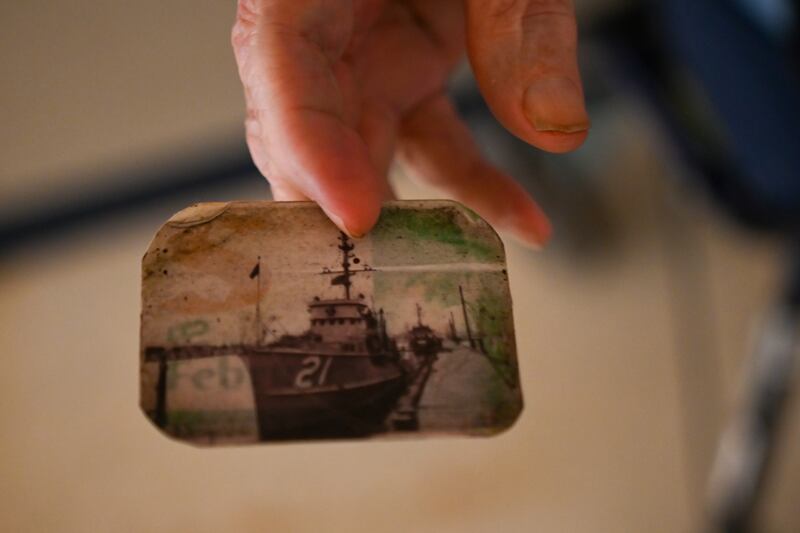
He says lost his housing after being in the hospital for months. When he came back, much of his possessions were gone from the storage locker where they were held. His granddaughter is helping him fix up a motor home, but he worries he’s already asked too much. “I’ve been putting too much pressure on her,” William says. “She doesn’t know it, but I know it.”
He wears a hat that reads “Korea Veteran” and shows us a photograph of the ship he served on, which he took himself, then shifts into a terse commentary on socialism. “I didn’t fight for that,” he says softly. SUZETTE SMITH.
Oregon Convention Center
7 pm | 90 degrees
Brandon’s cats, Moshe and Gwennie, sit quietly in separate crates, provided by Multnomah County when he arrived at the cooling shelter. Their own carriers were soiled.
He was making ends meet until recently—enough to afford $75 a night at a Motel 6 near Tualatin—but Brandon came up $9 short just as the heat wave started. He found himself pushing a shopping cart with his two cats in it, calling around to different help lines. An operator for 211 directed him to the Convention Center cooling shelter. He paid for his own cab ride.
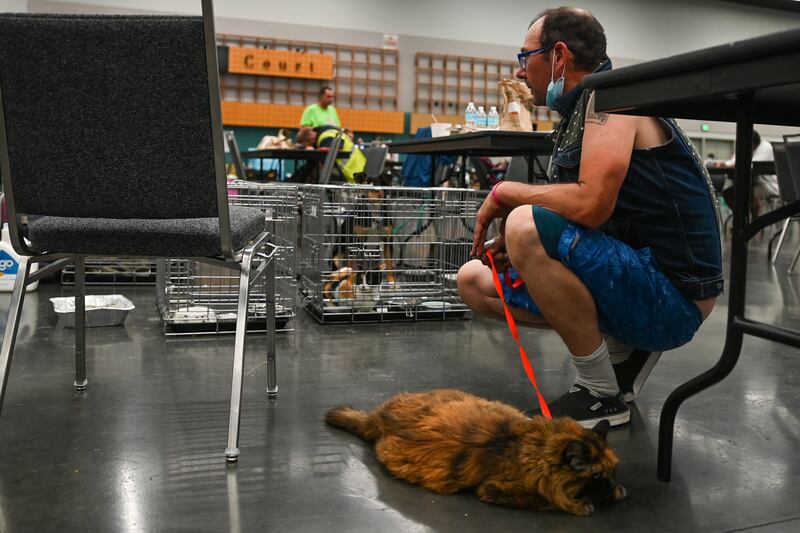
“Do you think someone from an animal hospital could come wash my cats?” he asks. “They both had accidents on the way here. Moshe is older so she has trouble sometimes. I was so worried about her. She was panting and limp.”
The Oregon Convention Center doesn’t even have showers for people, though. In the restroom a woman calmly cleans up with some moist towelettes. She doesn’t seem bothered by the other person in the restroom—a woman mumbling fragmented thoughts, punctuating them with short screams. SUZETTE SMITH.
SATURDAY, JUNE 26
Oregon Convention Center
1:30 pm | 95 degrees
Draydon made his way to the cooling shelter after finding himself homeless—again—after moving into the area to live with a friend. Sitting at his feet is a large fur-covered mask that fits over his head. The mask has a personality called Zaphire, intertwined with Draydon’s own identity. “She’s a mysterious figure,” Draydon explains. “I’m still figuring her out.”
Though Draydon is trans-masculine, he has been using the women’s restroom because the men’s is outfitted with automatic flush toilets. He explains that because he’s on the autism spectrum, certain sudden, uncontrollable sounds can cause him distress.
But when we speak to him, he’s excited, having just posed for a photo with U.S. Sen. Ron Wyden. “I’ve never taken a photo with a senator.” Draydon says. “I’ve never been close to someone with that level of power. Holy moly, he patted my back!”

Wyden says he’s touring the cooling shelter to thank volunteers and listen to the people staying there. “I don’t think there’s any question that this temperature challenge is driven by climate change,” he says. SUZETTE SMITH.
Sunrise Center
2 pm | 106 degrees
Along Southeast 188th Avenue, a rotating sprinkler fountain sprays water in a glorious arc, working with fan-powered misting nozzles to create small rainbows suspended in the air.
Working together is a theme here. “Over a dozen organizations!” boasts Caleb Tel Coder. “We have all these folks in our workforce helping the neighbors.” Coder uses “neighbors” as a default label for everyone at the center, and “workforce” to describe both volunteers and permanent staff.
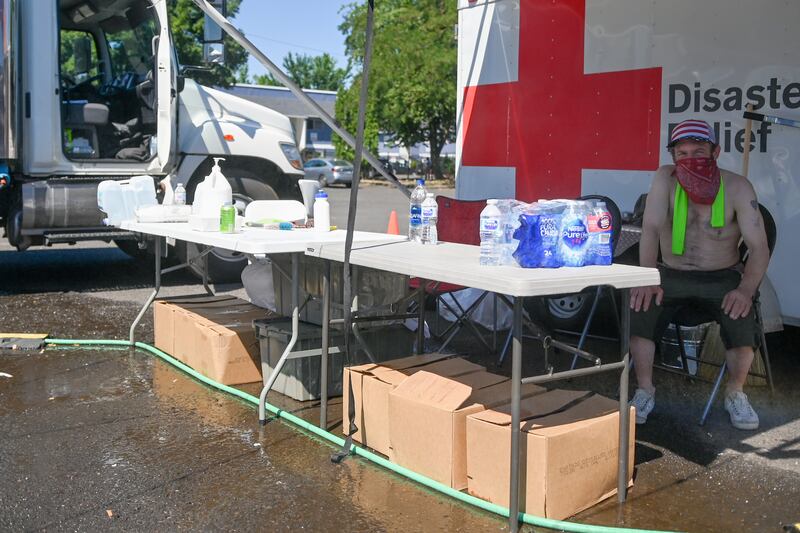
Behind him, pups belonging to residents run gleefully back and forth through the garden hose-powered fountain as Bernard “Beard’' Hahm watches from the shade with satisfaction: job well done. Both wear faded T-shirts and work boots, with fluorescent yellow cooling towels around their necks.
Both Coder and Hahm have been houseless. Both work for a neighborhood nonprofit, Cultivate Initiatives, that’s contracted by the county to help run the Sunrise Center cooling shelter.
Though it’s near midday, most of the 40-person capacity shelter’s guests—currently around 30— are dozing on the county-provided black mats. Coder tells WW the sleeping areas are separated into two: “Women, couples, families here, and single men over there.” In contrast to the other shelters, couples and families have pulled their mats together, breaking the orderly lines. JUSTIN YAU.
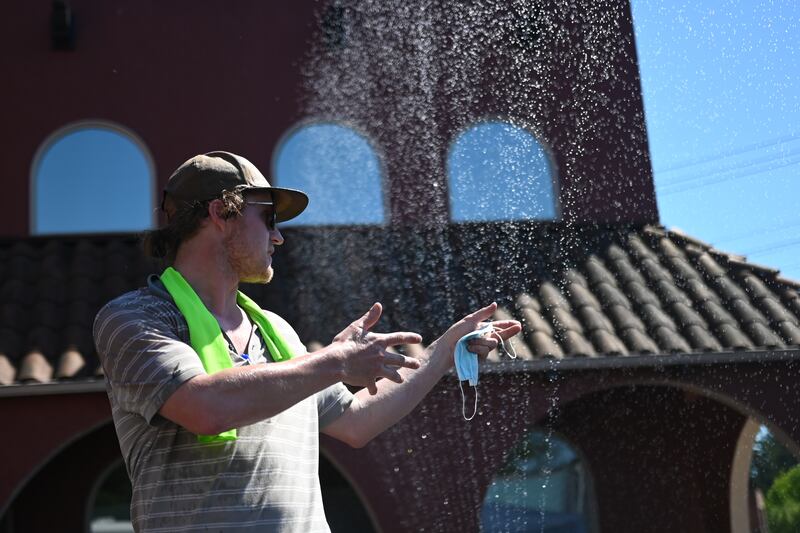
Rosemont Court
4:30 pm | 100 degrees
Burma Thomas was watering her flowers in the courtyard of her North Portland apartment building when the temperature crested 100 degrees. So she used the hose nozzle to douse herself in cold water, fully clothed.
It was part of a beat-the-heat routine. “Usually, I just take a shower with all my clothes on,” says Thomas, 68. “If it gets real rough, I’ll walk around in my underwear.”
She’s now offering to douse her neighbors at Rosemont Court, an apartment complex for people over 55. But water comes as a suspicious gift here: 13 of its residents have fallen ill with Legionnaires’ disease in the past six months, and some are still scared of showering or drinking the water, even though the bacteria are only dangerous when inhaled.

Rosemont Court has just under 100 residents over 55 living in its rooms. Those apartments don’t have air conditioning, unless residents footed a $250 bill to install a window unit in preparation for the weekend. Some did while others are relying on fans.
Another resident, Marilyn, tells WW she learned to lay ice packs over her wrists to keep cool at a young age. She lies on her bed at 10 am on Saturday morning—it’s already reached 82 degrees in her room, and she’s feeling nauseous and dehydrated.
Elizabeth Gonzalez, also 68, is taking the wet-clothing route, too: She tells WW she plans to strip down to her underwear the following day and get soaked in the shower, then hide out in her bedroom, which has a window AC unit.
“My car has beautiful AC in it, but walking to the parking lot is a trip. It’s a bit of a walk,” Gonzalez says. “Where would I go? I’m not going to drive to the coast with a million other people.” SOPHIE PEEL.
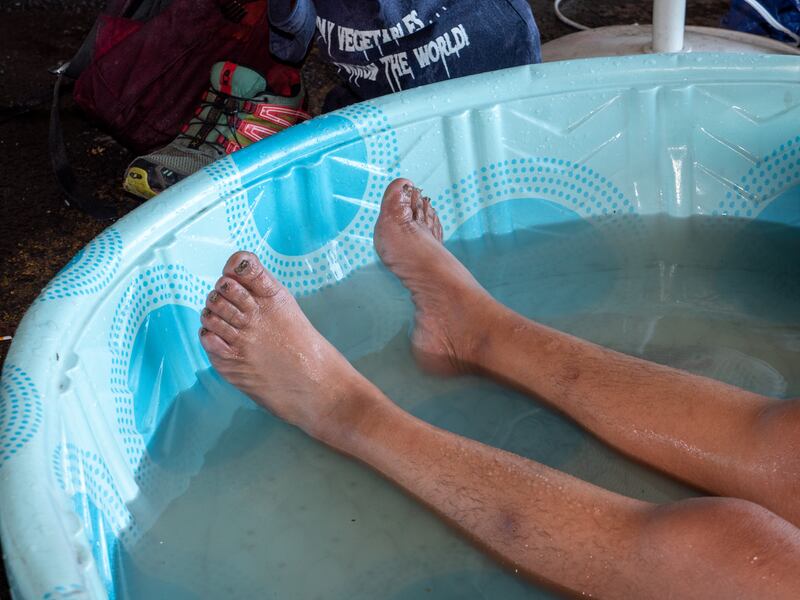
SUNDAY, JUNE 27
Arbor Lodge
1:30 pm | 106 degrees
Kevin heard about the cooling shelters on TV but never thought he would wind up in one. The silver-haired St. Johns resident figured he would not be at risk from the heat—aside from being diabetic—and planned to ride out the wave in his house, next to a fan.
Then he started to feel lightheaded. He made his way to the St. Johns fire station, his common practice when he worries his blood pressure might be too high. They told him to get to a cooling shelter.
He’s just finished a turkey sandwich. The Arbor Lodge shelter has around 15 people in it now, but most are sleeping.
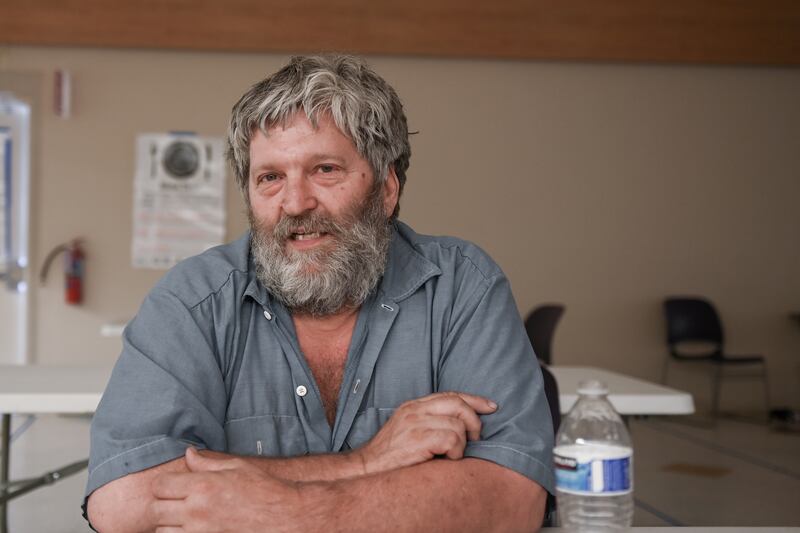
On this visit, William, the Korean War vet, now has a raised cot. The floor mats provided by the county are too low, and once he’s on the floor, it’s difficult for him to stand back up.
Asked about the persistent heat wave, William says softly: “People are reading the Bible and finding out it’s true….Christ will be coming and he will be ruling in time. We don’t know when. We don’t know lots of things about it. We do know that one-third of the world’s population will be gone, and one-third of the water. And I don’t remember the last one.”
Outside, mirages in the street reflect sky in every direction. The wind doesn’t help. It’s like being inside a hair dryer on full blast. SUZETTE SMITH.
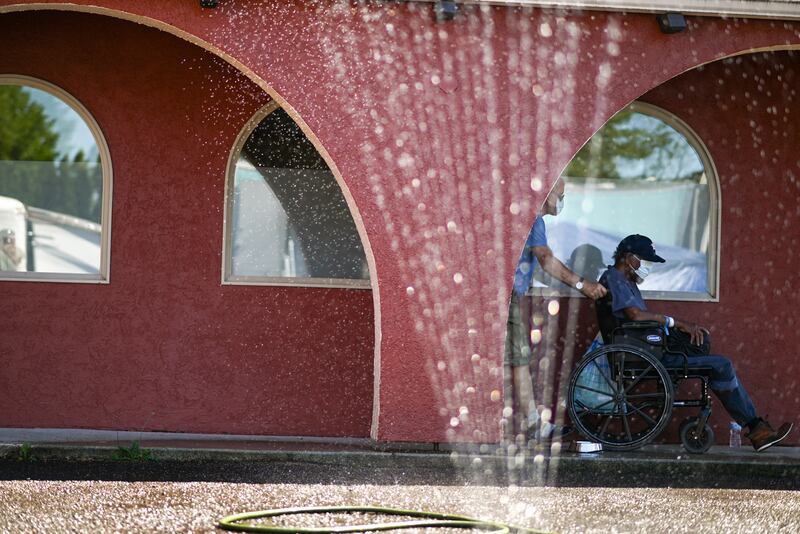
Peninsula Park
4:33 pm | 111 degrees
Just as Portland crosses into the 110s, wispy notes of “Turkey in the Straw’'—an anthem of frozen-confection peddlers nationwide—drifts through Peninsula Park’s heat-drenched air. Children and parents alike jerk their heads up and look around, trying to discern the direction and distance to an ice cream truck that would venture into this inferno.
“I am the founder, the owner, the lunatic who’s out in 110-degree weather selling popsicles!” Michael “Mick” Shillingford says with bravado.
Dressed in a sky blue uniform, Shillingford jumps off the truck, and opens the vending window. His sign—boasting over 30 flavors of “handcrafted, all-natural” popsicles, from Arnold Palmer to Strawberry Lemonade”—abruptly falls and he moves to tape it back on. The adhesive is melting.
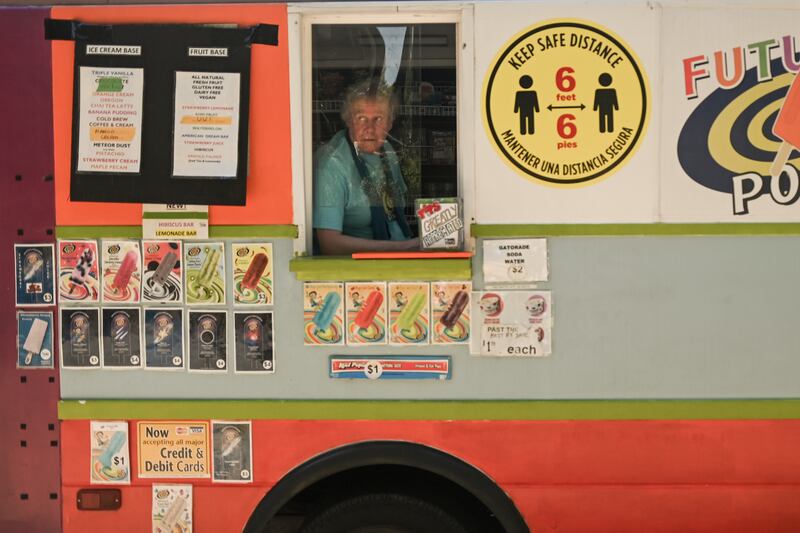
Having sold ice cream since 1994, Shillingford tells WW he bought the delivery truck at an auction three to four years ago, before converting it to the Future Pops truck. “If I have trouble staying cool, then there is a problem!” he declares in a thick South London accent.
“What can a dollar buy me?” one adult asks. It can buy a bright red frozen Otter Pop.
“Break that in half and you’ll have two!” Shillingford tells them. The parent—wearing a loose-fitting gray wife beater and a kippah—later tells WW their name is CJ and describes themself as a “queer Jewish park dad.”
CJ and their kid, as in many households in Portland, do not have central air conditioning. That day they’d borrowed a rotating tower fan from a friend and visited some friends with a pool. They are rounding out the day at the Peninsula Park splash pad.
“Luckily, we are on the first floor,” CJ says. They gesture to their kid. “At night, this one sleeps with a fan straight on him.” The kid, now dappled with red Otter Pop stain, nods. JUSTIN YAU.
